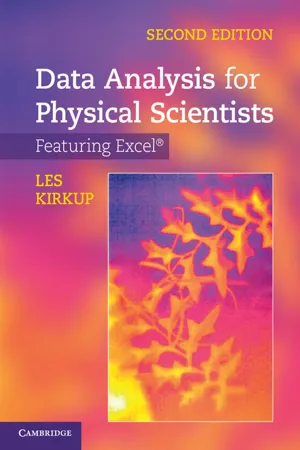
- English
- PDF
- Available on iOS & Android
About this book
The ability to summarise data, compare models and apply computer-based analysis tools are vital skills necessary for studying and working in the physical sciences. This textbook supports undergraduate students as they develop and enhance these skills. Introducing data analysis techniques, this textbook pays particular attention to the internationally recognised guidelines for calculating and expressing measurement uncertainty. This new edition has been revised to incorporate Excel® 2010. It also provides a practical approach to fitting models to data using non-linear least squares, a powerful technique which can be applied to many types of model. Worked examples using actual experimental data help students understand how the calculations apply to real situations. Over 200 in-text exercises and end-of-chapter problems give students the opportunity to use the techniques themselves and gain confidence in applying them. Answers to the exercises and problems are given at the end of the book.
Tools to learn more effectively

Saving Books

Keyword Search

Annotating Text

Listen to it instead
Information
Table of contents
- Cover
- DATA ANALYSIS FOR PHYSICAL SCIENTISTS: FEATURING EXCEL
- Title
- Copyright
- Dedication
- Contents
- Preface to the second edition
- Preface to the first edition
- Chapter 1: Introduction to scientific data analysis
- Chapter 2: Excel and data analysis
- Chapter 3: Data distributions I
- Chapter 4: Data distributions II
- Chapter 5: Measurement, error and uncertainty
- Chapter 6: Least squares I
- Chapter 7: Least squares II
- Chapter 8: Non-linear least squares
- Chapter 9: Tests of significance
- Chapter 10: Data Analysis tools in Excel and the Analysis ToolPak
- Appendix 1: Statistical tables
- Appendix 2: Propagation of uncertainties
- Appendix 3: Least squares and the principle of maximum likelihood
- Appendix 4: Standard uncertainties in mean, intercept and slope
- Appendix 5: Introduction to matrices for least squares analysis
- Appendix 6: Useful formulae
- Answers to exercises and end of chapter problems
- References
- Index
Frequently asked questions
- Essential is ideal for learners and professionals who enjoy exploring a wide range of subjects. Access the Essential Library with 800,000+ trusted titles and best-sellers across business, personal growth, and the humanities. Includes unlimited reading time and Standard Read Aloud voice.
- Complete: Perfect for advanced learners and researchers needing full, unrestricted access. Unlock 1.4M+ books across hundreds of subjects, including academic and specialized titles. The Complete Plan also includes advanced features like Premium Read Aloud and Research Assistant.
Please note we cannot support devices running on iOS 13 and Android 7 or earlier. Learn more about using the app